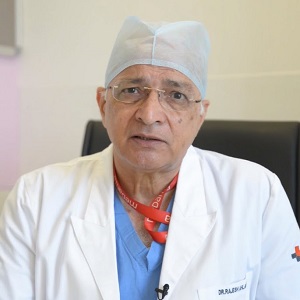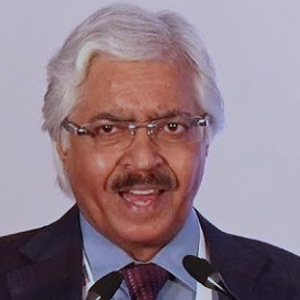Best Doctors in India for Alcoholic Hepatitis Treatment
- Obstetrician & Gynaecologist, Gurugram, India
- Over 20 years’ experience
Profile Highlights:
- With an experience of 20 years, Dr. Buchun Mishra is a practicing gynecologist, who is proficient in performing gynae surgeries for ovarian cancer, uterine cancer, and cervical cancer.
- She finished her MBBS in 1999 from Veer Surendra Sai Institute of Medical Sciences and Research, Sambalpur, Odisha. She later completed her DNB in 2011 from Army Base Hospital, in New Delhi. In 2013, she completed her fellowship from Rajiv Gandhi Cancer Institute and Research Center, Delhi.
- Eye Surgeon, Ophthalmologist, Gurugram, India
- Over 15 years’ experience
Profile Highlights:
- Dr. Sameer Kaushal is a qualified eye surgeon who spent a few years in the Cornea, Cataract, and Refractive Surgery Unit of AIIMS gaining expertise in the treatment of eye diseases, especially corneal disorders.
- Dr. Kaushal also gained valuable experience in performing various eye surgeries, especially anterior segment surgeries including phaco surgery for cataracts, LASIK, and corneal transplantation. His expertise extends to the latest treatment modalities which include sutureless corneal transplants and artificial corneas.
- Throughout his career, Dr. Sameer Kaushal has also been involved in teaching as well as research activities.
- Obstetrician & Gynaecologist, New Delhi, India
- Over 30 years’ experience
Profile Highlights:
- With around 30 years of experience, Dr Geeta Chadha is one of the leading gynecologists in Delhi. She has worked at Indraprastha Apollo Hospitals for around 22 years. Earlier she worked as a gynecologist at Kolmet Hospital as well as Sharma Nursing Home in New Delhi.
- Dr. Geeta Chadha has multiple expertise such as minimally invasive surgery like organ-preserving in women with benign gynae conditions plus infertility and high-risk obstetrics.
- Plastic & Cosmetic Surgeon, New Delhi, India
- Over 28 years’ experience
Profile Highlights:
- Dr. Sunil Choudhary is the Principal Director & Chief of Plastic Surgery at Max Super Speciality Hospital, New Delhi.
- He has over 28 years of proficient experience in the medical field and has been honored for being the first-ever Indian Plastic Surgeon to be awarded Board Certification by the European Board of Plastic, Reconstructive & Aesthetic Surgery in Bern, Switzerland.
- Dr. Choudhary’s outstanding performance, especially in the field of Aesthetic Surgeries such as face reconstruction and breast augmentation, rhinoplasty, and microsurgery has earned him several awards and accolades.
- Urologist and Renal Transplant Surgeon, Gurugram, India
- Over 40 years’ experience
Profile Highlights:
- Dr. Rajesh Ahlawat is one of India’s top kidney transplant surgeons, who has worked in leading Institutions in North India and has established successful Minimally Invasive Urology programs including Robotic Surgery and Kidney Transplant services with excellent outcomes comparable to the best in the world.
- Throughout his career, Dr. Ahlawat has initiated and established four successful Urology and Renal Transplant programs in India
- Sr Consultant Doctor in Obstetrics & Gynaecology, Gurugram, India
- Over 30 years’ experience
Profile Highlights:
- Dr. Manavita Mahajan has been a practicing obstetrician & gynecologist in Gurugram for the last 30 years.
- Known for being a strong proponent of safe motherhood practices, Dr. Mahajan has worked to implement these practices in her hospital practice as well. She has also been a speaker and faculty on gynecological laparoscopy at several national conferences because of her laparoscopic surgical skills.
- Dr. Mahajan is also a trainer and faculty in various educational programs.
- Medical Oncologist, Gurugram, India
- Over 30 years’ experience
Profile Highlights:
- Dr. Ashok Kumar Vaid is a reputed Medical Oncologist in India with expertise in the treatment of blood, lungs, skin, breast, and gastrointestinal cancers.
- He is famously known for performing among the first 25 bone marrow transplants in a private hospital in India.
- Dr. Ashok Vaid’s primary area of focus lies in Leukemia, Lymphoma, Solid tumors, and the treatment of organ-specific benign and malignant tumors.
- He prefers to treat his patients using non-surgical and pain-free techniques that include hormone therapy, biological therapy, targeted therapy, and chemotherapy.
- Obstetrician & Gynaecologist, Gurugram, India
- Over 42 years’ experience
Profile Highlights:
- Dr. Suneeta Mittal is a renowned name in the field of obstetrics & gynecology who has done national as well as international research in women’s health leading to the introduction of emergency contraception & Medical abortion in India.
- Previously, Dr. Suneeta Mittal has served as a professor as well as head of the department of obstetrics & gynecology at All India Institute of Medical Science, New Delhi.
- She has multiple areas of expertise, such as infertility, adolescent reproductive health, endocrinological disorders, laparoscopic and hysteroscopy surgeries, as well as high-risk pregnancies.
- Interventional Cardiologist, New Delhi, India
- Over 30 years’ experience
Profile Highlights:
- Dr. Ashok Seth is one of the most well-known Interventional Cardiologists in India honored with both the Padma Shri and Padma Bhushan by the Government of India.
- He has more than 3 decades of experience in interventional cardiology and has performed over 20, 000 angioplasties and 50,000 angiograms till date.
- Dr. Seth holds a Fellowship of the Royal College of Physicians of Ireland, London, and Edinburgh along with several other degrees to his name.
- IVF Specialist & Gynaecologist, Gurugram, India
- Over 30 years’ experience
Profile Highlights:
- Dr. Nandita Palshetkar is one of the best and leading IVF specialists in India with expertise in all kinds of infertility treatment.
- She along with Dr. Hrishikesh Pai is responsible for starting Assisted Laser Hatching in India in 1998 and also delivered the first laser hatching twins in the country.
- With training in IVF and Micromanipulation from the University of Ghent, Belgium, Dr. Nandita Palshetkar has helped more than 25,000 couples to start a family. She along with her team of experts performs more than 3000 ART cycles every year.
Best Hospitals in India for Alcoholic Hepatitis Treatment
ALCOHOLIC HEPATITIS
Alcoholic hepatitis is a liver infection, which is mainly caused by frequent, heavy use of alcohol. Fat can build up in the liver cells, which might lead to inflammation as well as scarring of the liver.
Alcoholic hepatitis might be mild or severe. A patient might even need a liver transplant if proper treatment is not provided, or if they don’t stop consumption of alcohol.
It is also notable that all heavy drinkers don’t develop this condition, and sometimes this condition even develops in people who drink moderately. However, if you are diagnosed with this condition, it is important for you to quit drinking alcohol. People who continue drinking alcohol might face a huge risk of serious liver damage as well as death.
Symptoms
Depending on the amount of damage to the liver, the symptoms can vary. If you are having a mild form of the disease, you might not even experience any symptoms at all. However, as the damage continues to grow, you might experience the following:
- Changes in appetite
- Dry mouth
- Weight loss
- Pain or swelling in the abdomen
- Jaundice, or yellowing of the skin or eyes
- Fever
- Nausea and vomiting
- Easy bleeding or bruising
- Changes in your mental state, including confusion
- Fatigue
The symptoms of this condition are similar to those caused by a few other health conditions. Therefore, if you develop any of these symptoms, it is best to get a proper diagnosis as well as begin treatment.
Causes & risk factors
Alcoholic hepatitis generally develops when the alcohol you drink causes damage to your liver. However, it is not clear why alcohol does this damages only to some heavy drinkers.
Few factors that are known to play a role in this condition include:
- The body’s process that breaks down alcohol produces some toxic chemicals
- These chemicals can trigger inflammation that can destroy the liver cells
- Thus, over time, scars replace healthy liver tissue, thus interfering with the function of the liver
- This irreversible scarring, which is also termed cirrhosis, is the final stage of alcoholic liver disease
If you have hepatitis C and continue to drink, even moderately, you are more likely to develop cirrhosis.
Some heavy drinkers are also malnourished because they don’t eat a proper balanced diet. Alcohol and its byproducts also prevent the body from absorbing nutrition properly. Lack of nutrition can contribute to liver cell damage.
Some other risk factors that can lead to this condition include:
- Your sex- Women are usually at a higher risk of developing alcoholic hepatitis since the way alcohol is processed in women is different.
- Binge drinking- Having over five drinks within two hours for men and four or more for women can increase the risk of alcoholic hepatitis.
- Obesity- Heavy drinkers who are overweight are also more likely to develop alcoholic hepatitis and to progress from that condition to cirrhosis.
- Race and ethnicity- Hispanic and Negroid people might be at higher risk of alcoholic hepatitis.
- Genetic factors- According to studies, there may be a genetic component in alcohol-induced liver disease. However, it is difficult to separate genetic and environmental factors.
Diagnosis
If you are showing symptoms of alcoholic hepatitis, your doctor will first inquire about your medical history and alcohol consumption. Next, he/she will perform a physical exam to see if you have an enlarged liver or spleen. They might also need a few more tests to confirm your diagnosis, such as:
- Complete blood count (CBC)
- Liver function test
- Ultrasound of the liver
- Abdominal CT scan
- Blood clotting tests
In some cases, a liver biopsy might also be needed to confirm the diagnosis of alcoholic hepatitis. A liver biopsy requires your doctor to remove a tissue sample from your liver, which is then tested in the lab. This method helps to show the severity and type of liver disease.
Treatment
Stopping alcohol consumption is the most important treatment for alcoholic hepatitis. There is no cure for this condition, but treatment can help in reducing or eliminating symptoms, or stopping its progression.
It is also important to note that scarring of the liver is permanent, but treatment can aim to restore as much function as possible.
Dietary changes
Medication
Liver transplant
The best hope of recovery is to be aware of the signs and symptoms as well as to reduce, manage, or if possible, completely stop consumption of alcohol.
Complications
Alcoholic hepatitis might lead to severe other complications such as:
- Enlarged veins (varices)- In this condition, blood that is unable to flow freely through the portal vein, can back up into other blood vessels in your esophagus or stomach.
- Hepatic encephalopathy- This condition can be caused by the buildup of toxins if your damaged liver is unable to remove all the toxins from your body. It involves confusion, drowsiness, and slurred speech.
- Ascites- Ascites is a condition in which the fluid that accumulates in the abdomen may get infected and thus, require treatment with antibiotics. Although this condition is not life-threatening, it can be a sign of advanced alcoholic hepatitis, or cirrhosis.
- Kidney failure- A damaged liver affects blood flow to the kidneys, thus resulting in kidney failure.
- Cirrhosis- The scarring of the liver might lead to liver failure.
Prevention
Alcoholic hepatitis might be prevented if you take the following steps:
- Drink alcohol in moderation, if at all- For healthy adults, moderate drinking means no more than one drink a day for women of all ages and men older than 65, and not over two drinks a day for men aged 65 and younger. However, if you prevent all alcohol, it is a certain way to prevent this condition.
- Check before mixing medications and alcohol- Ask your doctor if it’s safe to drink alcohol while you are taking medications. Consider reading the warning labels on over-the-counter medications as well. Don’t drink alcohol when you are taking medications that warn of complications when combined with alcohol.
- Protect yourself from hepatitis C- Hepatitis C is an infectious liver disease that is caused by a virus. If it is left untreated, it may lead to cirrhosis. If you are having hepatitis C and you consume alcohol, you’re generally more likely to develop cirrhosis than if you don’t drink.















